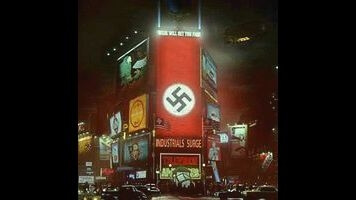“Sunrise” suffers a bit from Second Episode Syndrome. While it does advance the story on several fronts, much of the hour is given over to reinforcing what we’ve already learned from the pilot. This is not an uncommon technique in serialized television, it just tends to stand out more in the era of the binge-watch. For instance, the scenes involving Tagomi meeting with the Nazi ambassador or with his incognito contact Wegener regarding the upcoming visit of the crown prince and princess might serve as necessary reminders with a week between episodes, but tend to feel repetitious when viewed shortly after the previous hour.
Second episodes also tend to suffer from the burden of having to establish new expectations for a season’s pace and momentum. There’s a velocity in the pilot, with Joe and Juliana separately moving towards their identical goal, that stalls now that they’re settling into what looks to be an extended stay in Canon City. Juliana has little choice but to hang around, having lost all her money when Katie Owens stole her bag on the bus. She manages to talk the diner owner she’d earlier stiffed for the check (until Joe’s timely intervention, that is) into giving her a waitressing job, all the better to keep an eye out for her contact. She thinks she’s found him in the form of the customer designated as “Line-Faced Man” in the credits (played by Allan Havey, Mad Men’s Lou Avery). When she notices he’s reading a Bible, he suggests she buy one for herself and consult a passage from Ecclesiastes that mentions being “afraid of that which is high” (such as that man in the castle, perhaps) as well as a grasshopper (as in the title of the forbidden film she carries).
Joe is also hanging around Canon City, but his motivations are more opaque (a word that describes his character as a whole so far). He’s in constant communication with Obergruppenführer John Smith, who gives him a pretty good idea that Juliana is the Resistance contact he’s looking for, but Joe plays dumb and pretends he hasn’t been approached yet. Having spent the morning watching the sunrise over the Rockies from the top of a dam with Juliana, he adopts a wait-and-see attitude toward deciding what to do about her. That includes watching her interactions with the Line-Faced Man from his hotel room and calling in his suspicions about the man, who turns out to be an undercover agent of the SD (the intelligence division of the SS).
After steaming open a letter from Juliana intended for her mother (thus learning her true identity), Joe breaks into a “closed forever” movie theater for his own private screening of The Grasshopper Lies Heavy. Whatever effect it has on him remains hazy for now, but he’s at least willing to rescue Juliana from her meeting at the dam with the SD agent. His intervention isn’t necessary, as she uses her Aikido skills to flip the Line-Faced Man over the spillway, but maybe now that they’ve shared this life-and-death moment, a little more personality will emerge on both their parts.
One character who does undergo a substantial shift in the course of the episode is the amusingly monikered Frank Frink. No doubt most people in this world (as in our own) are like Frank: keep your head down, do nothing to attract the attention of the authorities, try to ignore the worst of what’s going on and just make the best life for yourself possible. As an unforeseen consequence of Juliana’s impulsive action, Frank is hauled in by the Kempeitai and tortured for his knowledge of the film’s whereabouts. Worse yet, his sister and her children are brought in and locked in a room where they will be gassed with Zyklon B unless he cooperates. Frank proves stronger than even he probably would have suspected; he doesn’t crack, even when he is led in front of a firing squad. He’s spared at the last moment when fake copies of the film are found in Juliana’s bag that was stolen from the bus, but it’s too late for his innocent family members. Doing nothing to attract attention is no longer an option for Frank.
As in the premiere, “Sunrise” is at its best when grounding its vision of a grim alternate reality in the quotidian, reassuring rhythms of mid-century America. When Obergruppenführer Smith sits down to breakfast with his family and chastises his son for reading at the table, we could be watching a scene from Ozzie And Harriet if not for the Nazi armbands. Smith‘s response to his son‘s desire to outdo his scruffy-haired nonconformist rival at school wouldn’t be substantially different were he a cop or a fireman or a hardhat in our own reality. It’s the context that makes it such a disturbing moment: Richie Cunningham as Hitler Youth. Maintaining this queasy tone on a consistent basis will be an important step in The Man In The High Castle graduating from a promising series to a very good or even great one.
Stray observations
- The Line-Faced Man’s origami habit plays like a shout-out to producer Ridley Scott’s previous Philip K. Dick adaptation Blade Runner, with its origami unicorns of controversial significance.
- This episode’s standout piece of alternate 1962 pop culture: American Reich, a Dragnet-style cop show laced with pro-Nazi values.
- While hanging around his hotel room, Joe listens to a record that must surely be banned outside the Neutral Zone: Billie Holiday’s “Strange Fruit.”
- Frank’s drawing of Juliana blows away in the wind because SYMBOLISM.





























![Rob Reiner's son booked for murder amid homicide investigation [Updated]](https://img.pastemagazine.com/wp-content/avuploads/2025/12/15131025/MixCollage-15-Dec-2025-01-10-PM-9121.jpg)











